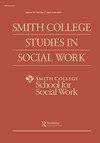Toward Decolonizing Social Work Practicum: From a Practicum Director’s Perspective
IF 0.9
Q2 SOCIAL WORK
引用次数: 0
Abstract
ABSTRACT The social work practicum, also called field education, is the signature pedagogy of social work education and is deeply rooted in the profession’s history. Unfortunately, the practicum reflects hegemonic Eurocentric values and is complicit in enacting oppression, privilege, and structural inequity. Therefore, social work needs to reckon with this history and with the need to decolonize the practicum, which has recently drawn the critical attention of social work educators and students engaged in social justice dialogs. This article argues that in social work education, practicum directors have assumed gatekeeping responsibility; practicum directors and administrators inevitably contribute to professional inequity and are complicit in its oppressive practices. Notwithstanding this fact, practicum education is positioned to play a critical role in decolonizing social work education, and practicum directors’ voices and perspectives are essential to implementing meaningful transformation. By critically examining the practicum process and offering suggestions for future discussions and liberatory action, this article examines the way that the social work practicum participates in oppressive practice from a practicum director’s perspective.走向非殖民化社会工作实习:从实习主任的角度
本文章由计算机程序翻译,如有差异,请以英文原文为准。
求助全文
约1分钟内获得全文
求助全文
来源期刊

SMITH COLLEGE STUDIES IN SOCIAL WORK
SOCIAL WORK-
CiteScore
1.50
自引率
10.00%
发文量
10
期刊介绍:
Smith College Studies in Social Work focuses on the vital issues facing practitioners today, featuring only those articles that advance theoretical understanding of psychological and social functioning, present clinically relevant research findings, and promote excellence in clinical practice. This refereed journal addresses issues of mental health, therapeutic process, trauma and recovery, psychopathology, racial and cultural diversity, culturally responsive clinical practice, intersubjectivity, the influence of postmodern theory on clinical practice, community based practice, and clinical services for specific populations of psychologically and socially vulnerable clients.
 求助内容:
求助内容: 应助结果提醒方式:
应助结果提醒方式:


